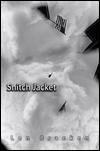
WASHINGTON, D.C.—Word spread quickly on activist websites in early 2006 concerning an informer who participated in numerous protests and caused lots of trouble. She left the scene and was finally spotted in the friendly company of federal agents.
Incidents such as this make it impossible for people to know whom to trust, according Len Bracken, author of the recently published novel Snitch Jacket. “Even if you’re not doing anything wrong,” Bracken says, “you question whether the person next to you will inform on the basis of imaginary facts and testify falsely against you.”
Bracken’s activism includes the Campaign for Nobody in 2000, which finds its way into his novel Snitch Jacket as a reminder that nobody did in fact win. He was once a member of a radical union and a far-left federation, and although he doesn’t want to discourage people from organizing, he thinks it’s prudent to consider a DHS round up of activists in the first days of martial law in the United States—especially in the event of another 9-11 attack or real opposition the neocons’ foreign wars.
According to Bracken, DHS will likely pick up activists whom federal authorities think could foment social unrest—the people on the current equivalent of what was called the Federal Bureau of Investigation’s “agitator index” in the sixties - along with those on the enemies list drawn up by Karl Rove. The feds will then round up Muslims and select immigrants, and send them all off to detention camps such as the ones Halliburton was contracted to build or the installations where the Army would impose what its regulations call a “civilian inmate labor program.” Even if you simply oppose the war, Bracken said, that could be enough to justify internment under martial law. “And you can never know who will squeal on you,” he said.
The last thing one wants to be thought of in activist circles is a snitch. For this reason, a snitch jacket is sometimes wrapped around activists by the Feds to discredit them—a practice also referred to as “agent baiting.” In his novel, Bracken shows that once the jacket is worn, it can never be completely removed. “I tell people not to tell me anything,” Bracken says. “And I don’t go to meetings anymore.”
Snitch Jacket is set in Washington, DC in the second half of the year 2000 and the first part of 2001. It follows the exploits of activists who occupy the Car Barn in Georgetown and moves with the black bloc through the barricades during the 2001 inauguration of George W. Bush. It concludes at an inaugural ball where the reader finds out what becomes of a television station owner when she comes under influence of Alex, the underground hell raiser, and glass after glass of coca wine.
Len Bracken is the author of the first biography in any language on the French radical Guy Debord and of the first widely distributed book published in the United States suggesting the September 11, 2001 attacks were an inside job. Bracken is an expert on the strategy of tension in Italy, and he has written an influential general theory of civil war that informs Snitch Jacket. His essays have appeared most notably in the Canadian Journal of Political and Social Theory and the London-based Principia Dialectica, where he has written a feature on the consequences of China’s rapid economic development in the context of his dialectical hedonism—a theory of pleasure and pain in rest and movement he first broached in a pamphlet-length work and also weaves into Snitch Jacket.
Bracken’s fiction, which has been described as “a new type of erotic novel, one where the social and sexual consciousness are uninhibited and integrated, free of strangulation from either a misguided political correctness or a reactionary puritanism,” attempts to subjectively chronicle his times with a sense of intimate realism. His books move from glasnost Russia where he lived as a teen to fall-of-the-Wall Berlin; from the protest-filled streets of Paris and Barcelona in the nineties to Washington at the time of the 2000 election. Bracken is currently writing a post-9-11 novel based on his film The Lazy Ones.
A student of five languages, Bracken was employed as a translator for a law firm and has translated works by Debord, Paul Lafargue and Gianfranco Sanguinetti. He recalls that the word for informant in Russian, donoschik, ironically mocks government officials. After the fall of the wall, Germans likewise set up the Bonzo Phone, named after a derisive term for communist bureaucrats. The French, Bracken says, make the distinction between a dénonciation of, say, a corrupt government official, and a délation, an informant’s report. This corresponds with the American whistleblower and snitch. A snitch could be an informant, as is the case with many journalists, or an informer such as the one who was recently uncovered. “While we welcome the tips from whistleblowers, we must oppose the climate created by snitches,” Bracken says. “And when they see the lengths to which the government has gone to harass and frame whistleblowers, activists should know they will not be spared the same or worse treatment.”
Bracken works as a copy editor for a daily newspaper. He is a graduate of George Washington University’s Elliot School of International Affairs.
iUniverse.com—$15.95—ISBN 0595375553
January 2006
| For information write to the following email address in conventional no spaces email format (spaced out here for security reasons): len bracken @ me . com |